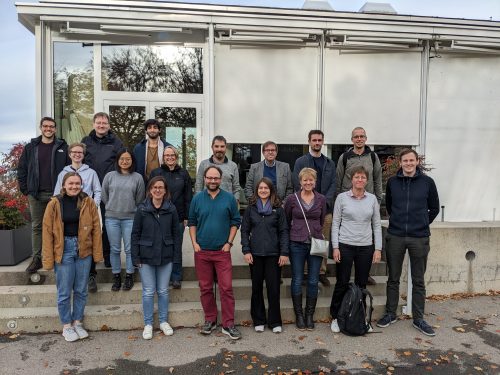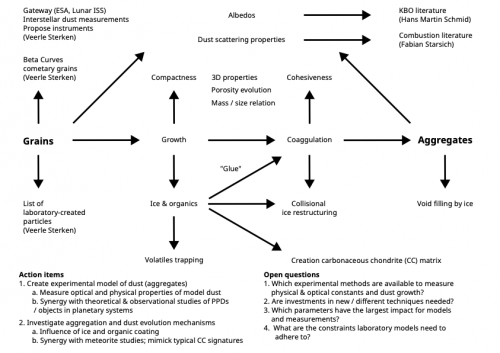Home › Research › Phase 3 › Phase 3 – Working Group 6 “Complex Dust”
Phase 3 – Working Group 6 “Complex Dust”
Goal of WG6 “Complex Dust”
Dust and solid bodies are a most important component of all planets and planetary systems from their formation to their later evolution states. Knowing better the properties and the evolution of dust particles and solid surfaces of larger bodies is therefore a key requirement for the investigation and understanding of planetary systems. However, solids are extremely diverse and undergo many complex processes and therefore many important aspects of solids are not well understood and often only considered in a highly oversimplified manner.
This working group aims for a strengthening of the cross-disciplinary discussion and collaboration between all the NCCR researchers working on dust and solid bodies. The goal is to combine the existing knowledge from different diciplines for more sophisticated interpretations of our measurements and model results.
We are particularly interested to learn about the following topics from NCCR experts working on:
- laboratory analysis of the chemical and physical properties of meteorites and micro-meteorites
- in-situ measurements of interstellar and interplanetary dust with spacecrafts experiments
- laboratory measurements of the reflectivity of analogues for surfaces of solid bodies in the solar system
- laboratory experiments and theoretical studies of icy particles
- micro-gravity experiments of the hydrodynamical properties of dust suspended in gas
- numerical modelling of the dust hydrodynamics in protoplanetary disks
- observational studies of the scattered and emitted radiation from dust in circumstellar disks
WG6 events:
2023-04-18: WG6 session at the PlanetS general assembly in Grindelwald
2023-03-30: Laboratory visits at ETH Zurich
2023-03-23: Laboratory visits at University Bern
2022-11-21: On day face-to-face workshop at ETH Zurich: Understanding the properties and evolution of dust and surfaces of solid bodies in planetary systems
2022-09-29: WG6 Kick-off zoom meeting: “Dust and Surfaces of Solid Bodies in Planetary Systems”
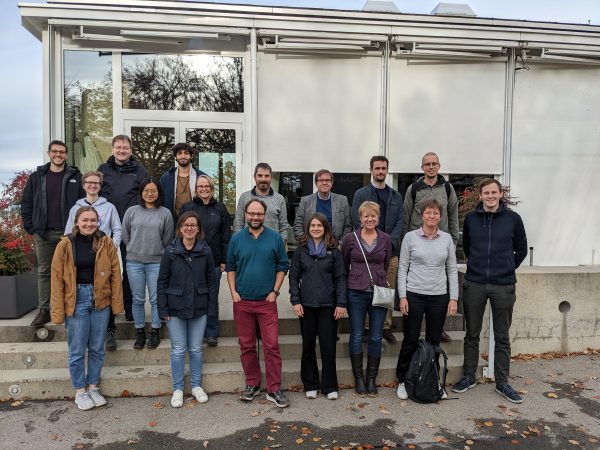
Participants of the workshop at the ETH Zurich (Nov. 2022)
Coordinating team
Nicola Allen (ETHZ), Holly Capello (UniBE), Niels Ligterink (UniBE), Antoine Pommerol (UniBE – co-chair), My Riebe (ETHZ), Hans Martin Schmid (ETHZ – chair)
Registration: if you like to receive information about the WG6 activities, then please register to the following e-mail list:
Past events:
Laboratory visits at ETH Zurich, Thursday March 30, 2023, 12 am to 5 pm
Laboratories visited:
Nanoparticle Systems Engineering: (Robert Nissler, Alexander Gogos)
Experimental Planetology: (Paolo Sossi)
Geochemistry Noble Gas Labs: (Henner Busemann and Colin Maden)
Clean labs and Mass spectrometry labs: (Manuela Fehr and Colin Maden)
Handling of small particles: (Nicola Allen and My Riebe)
Laboratory visits at the University Bern, Thursday March 23, 2023, 10 am to 4 pm
Laboratories or experiments visited:
COCoNuT and SPIPA: (Linus Stoekli and Antoine Pommerol)
PHIRE-2 and SCITEAS: (Raphael Ottersberg and Antoine Pommerol)
POLICES and FlyPol: (Lucas Patty)
ORIGIN and ICEBEAR: (Kristina Kipfer and Niels Ligterink)
Gross Labor and Maniac: (Martin Rubin)
Workshop, Monday Nov. 21, 2022, 9.30 am to 5 pm
ETH Hoenggerberg, Campus, Building HIT (Wolfgang-Pauli-Str. 27), Room HIT F12 (Coffee HIT G51)
Understanding the properties and evolution of dust and surfaces of solid bodies in planetary systems
one day WORK SHOP, Monday Nov. 21, 2022, 9.30 am to 5.00 pm, plus dinner; ETH Hoenggerberg
Organizing committee: Nicola Allen, Holly Capelo, Niels Ligterink, My Riebe, Hans Martin Schmid
According to our Kick-Off zoom discussions from September 2022, we would like to meet in a face-to-face meeting to get to know each other better and to learn from the knowledge about dust and surfaces of solid bodies in planetary system from different disciplines. The goal is to find well defined questions for scientific interactions and collaborations which could benefit from the knowledge of people working in different fields.
The work shop consists of an introductory session with solicited overview talks, followed by 3 sessions, each with first a few short (5 min) “rapid fire learning” talks followed by about 15 minutes of plenary discussions and 15 minutes of ad-hoc discussions within groups. During these discussions, we will start with setting up a “word map” for WG6, which will then serve as basis for the final discussions about possible science collaborations. At the end, we will try to formulate action items with goals and responsibilities.
Below is a little guide for the rapid fire learning speakers:
Rapid fire learning (RFL) works a little bit different than the scientific presentations most of us are used to. RFL presentations are short (5 minutes) and serve as catalyst for the discussion, to which most time is allocated in the session. The aim is to have as much interaction as possible, rather than a one-way flow of information. To help with making the presentation, we have number of pointers:
– Make your presentation short (~5 slides), as it has to fit in 5 minutes.
– Keep your introduction / context short and concise (1 slide)
– It is best to focus on the highlights or key concepts of your work
– However, it is ok to make slides information-dense and include information about the details (e.g., an equation, experimental technique, etc). You don’t have to cover the details during your presentation, but it may be useful for the discussion. Unlike a regular presentation, where you want to keep the attention of the audience for 30-45 min. and therefore use “clean” slides that are not saturated with information, in RFL slides it is ok to bombard the audience with info.
– You can use the presentation to point out some ideas for future research directions / experiments / open questions / collaborations / etc. This will help start the discussion.
– No problem to have a few back-up slides ready, but also be prepared to, for example, draw something on the blackboard.
end RFL guide
Agenda
09.30 Coffee (HIT G51)
10.00 Start of meeting, Welcome (Hans Martin), HIT F12
10.10 Overview talks (20′ + 5′), chair Holly
– Maria Schoenbaechler: Dust of the solar protoplanetary disk preserved in meteorites
– Clement Surville: Complex dust and drag: effect on planetesimal and planet formation
– Antoine Pommerol: Experimenting with complex dust
11.25 break
11.40 Session 1: Short talks “rapid fire learning”, 5′ each, chair (tbd)
– Veerle Sterken: Impact experiments with complex dust
– Kristina Kipfer: Ice around Dust, a laboratory perspective
– Jie Ma: Characterizing dust in protoplanetary disks with quantitative polarimetry
followed by discussions (Niels)
12.45 lunch (Restaurant Bellavista)
14.15 Session 2: Short talks “rapid fire learning”, 5′ each, chair Nicola
– Holly Capelo: Aerodynamical experiments with complex dust
– Niels Ligterink: Desorption studies of ice
– Alexander Gogos: From nanopharmaceuticals to cosmic dust analogues – a (short) travel through interdisciplinary space
followed by discussions (tbd)
15.00 Session 3: Short talks “rapid fire learning”, 5′ each, chair tbd
– Stefano Spadaccia: Thin layers of frost on top of dust
– Nicola Allen: Laboratory analyses of micrometeorites
– Hans Martin Schmid: Remote sensing of astrophysical dust near and far
followed by discussions (Niels)
15.45 Coffee break
16.00 Discussion on WG6 “Word Map”, chair Niels + Henner
17.00 Wrap up
Next steps and action items
17.30 End
18.00 Dinner, restaurant Hiltl
Participants of the workshop (17 persons + the photographer)
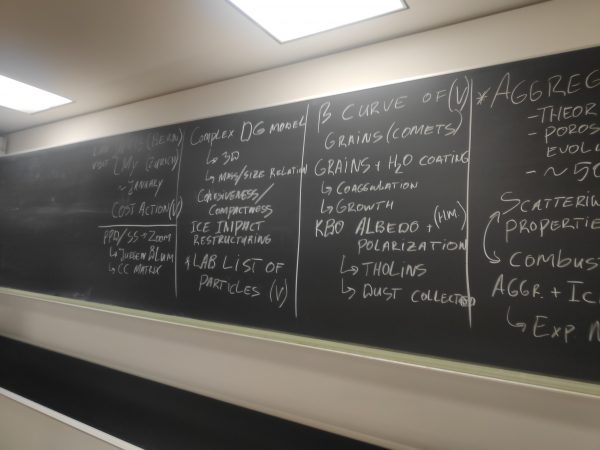
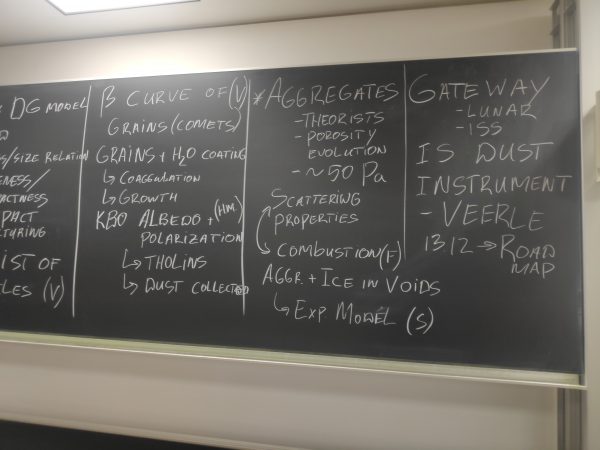
“Word map” compiled at the end of the workshop meeting
KICK-OFF, zoom meeting, Thursday Sept. 29, 1.30 pm to 4.30 pm
Agenda
1. Welcome and introduction
2. Current organisation of Working Group 6
3. Short talks (~ 1 hour)
“Dust and Surfaces of Solid Bodies in Planetary Systems”
Program:
Jie Ma, “Observations of dust in circumstellar disks”
Bodénan Jean-David, “Fossilised proto-planetary dust aggregate properties and implications for their aerodynamic”
Veerle Sterken, “In situ complex dust research in space and in the lab”
My Riebe, “Laboratory studies of dust”
Stefano Spadaccia, “Properties of regolith simulants”
4. Discussions: (~1 hour)
– goals and your expectations for WG6 “Complex Dust”
– how to proceed and preparation of workshop in November
Notes and Slides from the kick-off meeting can be downloaded here:




